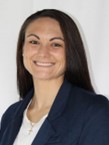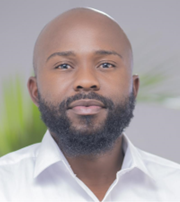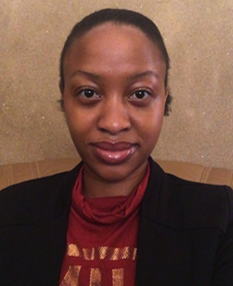The Global Evidence, Local Adaption, GELA project has four new students, who are currently enrolled in the MSc Clinical Epidemiology degree at the University of Stellenbosch. The four who hail from South Africa, Nigeria, and Malawi are all passionate about contributing to maternal and child health.
 Denise Sproul is a final-year MSc Clinical Epidemiology student at the University of Stellenbosch. She is a qualified specialist in Obstetrics and Gynecology, and she is currently working at Tygerberg Hospital and the University of Stellenbosch in Cape Town.
Denise Sproul is a final-year MSc Clinical Epidemiology student at the University of Stellenbosch. She is a qualified specialist in Obstetrics and Gynecology, and she is currently working at Tygerberg Hospital and the University of Stellenbosch in Cape Town.
Denise did her undergraduate work at the University of Cape Town and completed her internship at the Worcester provincial hospital in the Western Cape. She says it is where her passion for women’s health started. During her community service year, she moved to Mpumalanga and was based at the Rob Ferreira Hospital, where she worked in obstetrics and gynecology.
In 2019, Denise’s research work was also published in the South African Journal of Obstetrics and Gynecology, and she says this is where she discovered an interest in Evidence-Based Medicine.
She says she has a special interest in research, reproductive health, and women’s health, and her current research is looking at assessing the prevalence of family planning among postpartum women at Tygerberg Hospital.
Denise says her passions are in keeping with GELA’s aim of " maximising the impact of evidence for poverty-related diseases by increasing the capacity of decision-makers and researchers to use global research to develop locally relevant guidelines for newborn and child health". Denise says she has particularly enjoyed some subjects, including biostatistics, clinical guidelines, and systematic reviews.
 Ita-Lincoln Freedman is a young medical doctor born and raised in Nigeria. He qualified as a medical doctor in 2015 from the University of Calabar and works with the Department of Public Health and Community medicine at the University of Calabar Teaching Hospital in Southern Nigeria.
Ita-Lincoln Freedman is a young medical doctor born and raised in Nigeria. He qualified as a medical doctor in 2015 from the University of Calabar and works with the Department of Public Health and Community medicine at the University of Calabar Teaching Hospital in Southern Nigeria.
He has several years of experience working as a clinician and says he is passionate about ensuring access to medical care and immunisation services for the underserved in hard-to-reach communities in Africa's biggest nation. Ita-Lincoln says he is passionate about improving the quality of data in public institutions and their use in decision-making in healthcare and governance in the West African nation. Ita- Lincoln's ambition is to improve the accuracy, reliability, and accessibility of healthcare data and those of other health-related events.
He also hopes that the MSc Clinical Epidemiology course will equip him with data management and research skills to deal with some of the health challenges in his country and, as he says, perhaps it can, 'revolutionise' data management in publicly owned institutions in Nigeria. Ita-Lincoln hopes this will minimise the burden on funding agencies by taking ownership of innovation. He believes the GELA journey will help ensure that it contributes to guideline development in various clinical areas of practice in Nigeria by learning from GELA colleagues in the three countries.
Ita-Lincoln says he believes strengthening the capacity of more local researchers and policymakers, along with supporting the development and establishment of independent research institutes in low- and middle-income countries, will leave behind an enduring impact on the trajectory of research in these regions.
 Mphatso Kantonya says he has always been passionate about healthcare, and this has taken him from being a medical doctor working in rural hospitals in Malawi to now being one of the GELA MSc postgraduate students.
Mphatso Kantonya says he has always been passionate about healthcare, and this has taken him from being a medical doctor working in rural hospitals in Malawi to now being one of the GELA MSc postgraduate students.
He completed his medical training in 2016 and is currently working in a pharmacological randomised controlled clinical trial as a junior investigator in Malawi. The trial is being conducted under the Malawi Liverpool Wellcome (MLW) Clinical Research Programme.
Before joining the MLW programme, Mphatso was part of a team that collaborated with the University of North Carolina, UNC, in the Lilongwe Project, a Multi-Centre Modern Vaccine Efficacy Study, as a Research Medical Officer. He also previously worked in the primary health sector in several rural areas of Malawi.
Mphatso joined GELA in 2022 as an MSc candidate, and he says he is looking forward to improving his skills in data and evidence synthesis as well as systematic reviews. This, he says, correlates well with his research interests, which include malaria chemoprevention and treatment.
 Retsedisitsoe Prudence Mazibuko says is passionate about child and maternal health research issues. It is with this passion that she hopes to help address the health challenges in South Africa, especially in the rural areas of the country after the completion of her MSc Clinical Epidemiology degree.
Retsedisitsoe Prudence Mazibuko says is passionate about child and maternal health research issues. It is with this passion that she hopes to help address the health challenges in South Africa, especially in the rural areas of the country after the completion of her MSc Clinical Epidemiology degree.
She holds a BSc in Health Systems Sciences and has completed a postgraduate degree in Bioethics and Health Law both from Witwatersrand University. Prudence majored in Health Systems Sciences and Public Health and indicates that this is where she developed her interest in Clinical Epidemiology.
She says that as part of her research assignment for the MSc, her research areas will involve research in child health. Prudence says during her undergraduate degree, maternal and child health was one of the core research topics she studied. She says that it was during this time that she was exposed to the multiple and often complex health problems faced by both mothers and children. According to her, achieving good maternal and child health is a global health objective, but in order to achieve this, so more research must be conducted to find solutions to these critical health issues.
Prudence says she is looking forward to learning from GELA members in South Africa, Malawi, and Nigeria. The GELA scholarship is enabling her to pursue a postgraduate degree and is a dream come true for her. She says she strongly believes that the GELA project has the potential to address some maternal and child health problems which Africa is facing.
